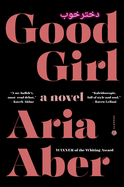
Poet Aria Aber's intimate, immersive first novel, Good Girl, follows 18-year-old Nila, newly returned home from boarding school, as she sinks into a milieu of intellectual ravers in Berlin. Nila, short for Nilab, has an intensity that threatens to overwhelm her and her Afghan-immigrant family. Now, living in her childhood bedroom again, Nila chafes at the "commonplace poverty" in what she calls "Berlin's ghetto": the Gropiusstadt, a district of "brutalist concrete and unemployment rates," an area that "lingers under [her] skin like a cauterizing substance."
Nila attempts to escape the neighborhood, her widowed father, and its tattling uncles and aunts by spending long nights popping pills and snorting powders at clubs and parties. Soon she becomes absorbed into a group of philosophy-quoting partiers that includes Marlowe, a has-been writer who takes a keen interest in her. He's twice her age and has a girlfriend, but that doesn't stop the two from developing a destructive, volatile sexual dynamic.
Growing alongside her fascination with Marlowe is Nila's interest in photography and her desire to become an artist. With Marlowe, like with all her friends and acquaintances, Nila conceals her background. She says she's Greek or Spanish, anything but the truth. But as she's increasingly confronted by the othering and targeting of Afghans and other immigrants from Muslim-majority countries, she finds it harder and harder to keep her identity a secret. Aber (Hard Damage) skillfully layers the tensions pulling Nila apart as a young woman trying to navigate what it means to be the daughter of Afghan immigrants in a country like Germany. --Nina Semczuk, writer, editor, and illustrator

